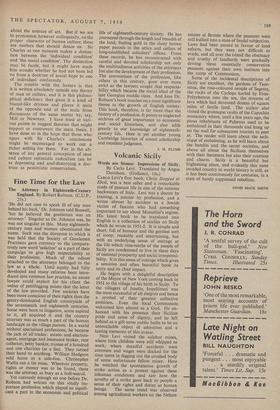Volcanic Sicily
Words are Stones: Impressions of Sicily. By Carlo Levi. Translated by Angus Davidson. (Gollancz, 16s.)
CARLO LEVI'S first book, Christ Slopped at Eboli, was a best seller and a remarkable study of peasant life in one of the remoter backwaters of Italy. Levi was a doctor by training, a painter by profession, and a writer almost by accident as a Jewish victim of fascism who had something important to say about Mussolini's regime. His latest book to be translated into English is a collection of studies on Sicily which he wrote in 1951-2. It is simple and short, full of humour and the gentlest sort of irony, readable and entertaining, but with an underlying sense of outrage at the life which nine-tenths of the people of Sicily are condemned to live in these days of national prosperity and social irresponsi- bility. It is this sense of outrage which gives a sensitive and often beautiful book its unity and its chief impact.
He begins with a delightful description of the Mayor of New York coming back in 1951 to the village of his birth in Sicily. To the villagers of Isnello, Impellitteri was the most successful of all émigrés and hence a symbol of their greatest collective ambition. Even the local Communists welcomed him almost as a God. He en- hanced with his presence their Sicilian pride and sense of dignity, and he left behind as a gift some public baths to be an untouchable object of adoration and a lasting memento of this avatar.
Next Levi visited the sulphur mines, where little children were still whipped to work, where dreadful accidents were common and wages were docked for the time spent in digging out the crushed body of some unfortunate fellow miner. Here he watched the spontaneous growth of strike action as a protest against these inhuman conditions and saw how the novelty of a strike gave back to people a sense of their rights and duties as human beings. The same trend was observed among agricultural workers on the Nelson estates at Bronte where the peasants were still bullied into a state of feudal subjection. Laws had been passed in favour of land reform, but they were not difficult to evade, and all over the island the obstinacy and cruelty of landlords were gradually driving these essentially conservative peasants against their own instincts into the camp of Communism.
Some of the incidental descriptions of Sicily are excellent, the gardens of Taor- mina, the rose-coloured temple of Segesta, the rocks of the Cyclops hurled by Etna- Polyphemus into the sea, the streams of lava which had devoured dozens of square miles of fertile land. The author also visited the grotesque vaults of the Capuchin monastery where, until a few years ago, the pious inhabitants of Palermo used to be embalmed in their thousands and hung up on the wall for subsequent tourists to peer at. The reader will learn about the tech- nique of embalming, as he will learn about the bandits and the secret societies, and above all about the Sicilians themselves with their fierceness but also their courtesy and charm. Sicily is a beautiful but frightening place, and evidently this most invaded country in world history is still, as it has been continuously for centuries, in a state of barely suppressed rebellion.
DENIS MACK SMITH


























 Previous page
Previous page